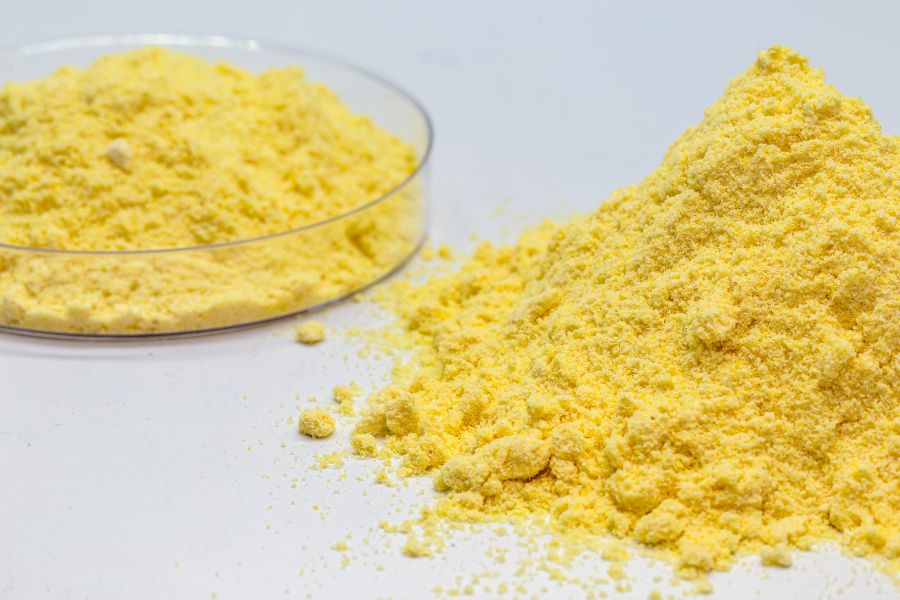
Where is sulfur used in everyday life?
February 26, 2024
What is the environmental impact of sulfur production?
March 7, 2024Sulfur is essential for a multitude of industries and is widely utilized in everyday activities. It serves as a critical component in the production of fertilizers, chemicals, and pharmaceuticals. However, concerns about its safety for human health have arisen, particularly regarding its potential respiratory and skin irritations, as well as its possible adverse effects on the environment.
Industrial sulfur can pose health risks, primarily through inhalation of sulfur dust or fumes. Exposure to high levels of sulfur dioxide, a byproduct of sulfur combustion, can irritate the respiratory system. Additionally, sulfuric acid, a common derivative of sulfur, is corrosive and can cause severe burns if not handled properly. Therefore, proper safety measures, such as ventilation systems and personal protective equipment, are essential when working with industrial sulfur to minimize health risks.
This post addresses the question ‘Is sulfur safe for humans?’ by exploring its role across various industries and applications as well as its potential health effects when encountered in different forms. Keep reading to learn whether sulfur is safe for humans.
Applications and Side Effects of Sulfur
Sulfur is widely utilized across various industries and applications, ranging from agriculture to health and medicine. While it plays a crucial role in numerous processes, concerns about its safety for human use have been raised due to potential side effects associated with its various applications.
Sulfur in Agriculture
Sulfur is a vital component in agriculture, primarily used in the form of sulfur-containing fertilizers to enhance plant growth and soil fertility. It aids in the synthesis of essential amino acids and vitamins in plants, contributing to their overall health and productivity.
By ensuring adequate sulfur supply, farmers can improve how plants absorb nutrients, boost their internal processes, and make them stronger against environmental challenges. This helps in promoting sustainable farming methods and increasing crop yields, which is essential for ensuring that there is enough food for everyone in the future.
Possible Side Effects
Exposure to sulfur poses risks of respiratory irritation through inhalation of sulfur dust or fumes during application, potentially leading to discomfort and respiratory distress. Additionally, direct contact with sulfur can provoke skin irritation or allergic reactions. Those with heightened skin sensitivities or allergies may be more prone to experiencing skin irritation or allergic reactions upon direct contact with sulfur.
Implementing proper ventilation and personal protective equipment during application can reduce respiratory risks, while wearing gloves and taking precautions to minimize skin contact can help prevent skin irritation and allergic responses, ensuring safer handling and use of sulfur-based products.
Sulfur in Industry
In the industrial sector, sulfur plays a crucial role in the synthesis of a wide array of chemicals, including sulfuric acid, sulfur dioxide, and sulfur hexafluoride, which are essential for numerous industrial processes. These chemicals have diverse applications, ranging from acid production for batteries and fertilizers to serving as refrigerants and electrical insulators.
Moreover, sulfur is integral to the manufacturing processes of rubber, where it acts as a vulcanizing agent to enhance elasticity and durability, as well as in paper production to improve strength and water resistance. Sulfur compounds are also utilized in pharmaceutical manufacturing, serving as key components in various drugs and medications. This extensive utilization of sulfur highlights its significance across multiple industrial domains, driving innovation and economic growth while necessitating careful management to minimize potential environmental and health hazards associated with its production and use.
Possible Side Effects
Potential side effects of sulfur use include both environmental and health concerns. The combustion of sulfur-containing fuels can result in the release of sulfur dioxide, exacerbating air pollution and triggering respiratory problems.
Direct exposure to sulfur dioxide gas poses toxicity risks, potentially inducing respiratory distress, particularly in those with pre-existing lung conditions.
To minimize these effects, implementing emission controls like scrubbers and catalytic converters can help reduce sulfur dioxide emissions from industrial activities.
Additionally, ensuring the use of personal protective equipment such as respiratory gear is essential for workers handling sulfur or its compounds, minimizing the risk of inhalation-related health issues.
Sulfur in Health and Medicine
Sulfur plays a significant role in health and medicine, with its compounds being employed in a variety of medical treatments. Particularly, sulfur-based skin medications are widely utilized to address common dermatological conditions such as acne, eczema, and fungal infections, owing to their antimicrobial and anti-inflammatory properties.
These medications work by regulating sebum production, reducing inflammation, and combating microbial growth on the skin’s surface. Furthermore, sulfur-containing drugs are instrumental in the management of certain systemic conditions, including rheumatism, where they are utilized for their analgesic and anti-inflammatory effects, providing relief from pain and inflammation associated with joint disorders.
The versatility of sulfur in medical applications indicates its importance in addressing a broad spectrum of health issues, offering effective therapeutic options for both topical and systemic treatments.
Possible Side Effects
Potential side effects associated with sulfur-based treatments primarily involve skin sensitivity and allergic reactions. People may experience skin irritation or dryness upon using sulfur-based topical products, while allergic responses can manifest as rashes, itching, or swelling.
To minimize these risks, it is advisable to conduct a patch test before the widespread application of sulfur-containing skincare products, allowing for the identification of any adverse reactions.
Additionally, moisturizing the skin alongside sulfur-based treatments can help alleviate dryness and irritation, promoting a more comfortable and tolerable experience for those undergoing such therapies.
Sulfur in Food and Beverages

Sulfur dioxide serves a critical role in the food and beverage industry as a potent preservative, widely utilized to extend the shelf life and maintain the quality of various products. Its antimicrobial properties make it effective in inhibiting the growth of bacteria, yeasts, and molds, thereby preventing spoilage and foodborne illnesses.
Moreover, sulfur dioxide acts as an antioxidant, protecting food and beverages from oxidative deterioration and maintaining their color, flavor, and nutritional integrity. Commonly added to items such as dried fruits, wine, and processed meats, sulfur dioxide helps prolong their freshness and enhances their stability during storage and distribution.
However, it is essential to note that some people may be sensitive to sulfites, a subgroup of sulfur compounds, prompting regulatory requirements for labeling sulfite-containing products to ensure consumer safety and informed choice.
Possible Side Effects
Potential side effects associated with sulfur dioxide and sulfites in food preservation primarily revolve around respiratory issues and sensitivities.
Sulfur dioxide emissions from preserved foods have the potential to trigger asthma attacks or respiratory discomfort, particularly in those with pre-existing respiratory conditions. Moreover, some people may experience adverse reactions such as headaches, nausea, or allergic responses due to sulfite sensitivity.
To minimize these risks, clear labeling of food products containing sulfites is essential to alert consumers with sensitivities, enabling them to make informed choices.
Additionally, exploring alternative preservation methods or processing techniques can provide viable options for those sensitive to sulfites, ensuring food safety and inclusivity in dietary choices.
Sulfur in Household Items
Sulfur compounds play a crucial role in household items, including detergents, soaps, and cleaning agents, owing to their potent antibacterial and antifungal properties. These compounds effectively combat microbial growth, ensuring cleanliness and hygiene in household environments.
Moreover, sulfur-based pesticides serve as valuable tools for pest control in gardens and households, targeting a wide range of pests such as mites, ticks, and fungi. By disrupting vital physiological processes in pests, sulfur-based pesticides offer an environmentally friendly alternative to conventional chemical pesticides, minimizing harm to beneficial organisms and ecosystems.
Possible Side Effects
Direct contact with sulfur-based cleaning products can result in skin and eye irritation, while inhalation of sulfur fumes may irritate the respiratory system. To minimize these potential risks, it is important to adhere to precautionary measures.
This includes reading labels carefully to follow usage instructions and safety precautions provided by the manufacturer. Additionally, ensuring adequate ventilation during the use of sulfur-based cleaning products is crucial to minimize the risk of inhaling irritants.
By taking these precautions, users can minimize the likelihood of experiencing adverse effects associated with the use of sulfur-based cleaning agents, ensuring safer handling and usage practices.
Final Thoughts
When it comes to human health, sulfur is considered non-toxic in small amounts but may irritate the eyes, skin, and respiratory system in large doses.
To answer the question “Is sulfur safe for humans?”, it should be emphasized that sulfur is a versatile element with numerous applications, from agriculture to pharmaceuticals. However, its use can pose significant risks to human health and the environment if not handled properly.
Responsible use of sulfur involves following safety guidelines at all stages of its use, from storage and handling to disposal. This includes using personal protective equipment (PPE) such as gloves and masks when handling sulfur, ensuring proper ventilation in areas where sulfur is used or stored, and carefully following instructions for mixing and application to minimize exposure.
Furthermore, it is essential to be aware of the potential environmental impacts of sulfur use, such as air and water pollution. By using sulfur responsibly and in accordance with safety guidelines, we can minimize these risks and ensure its continued use as a valuable industrial resource.
To connect with Adept Trade instantly, reach out on WhatsApp at +971 50 886 1297 or drop an email at info@adept-trade.com



